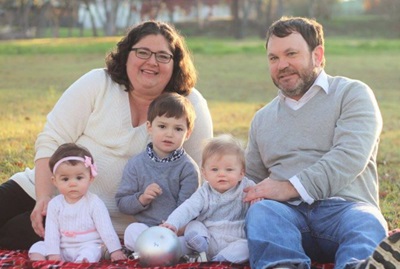“What Melissa was experiencing wasn’t uncommon,” according to Ross Teemant, LCSW, senior director of Behavioral Health for Texas Health Resources. “Some degree of emotional vulnerability is natural and expected after childbirth. Moms often feel better after getting some rest and getting a helping hand with the baby. But if the blues last for more than two weeks or get worse, it’s time to talk to a health care provider.”

Melissa’s Story
For Melissa, an uneventful early pregnancy gave way to skyrocketing blood pressure at 34 gestational weeks. A feeling of hopelessness crept in as talk of an emergency c-section turned to reality. She had given birth naturally once before to her older son. A c-section brought unknowns and the unexpected. It was all Melissa could do to make it through surgery and recovery and watch as little Violet and Linus were admitted to the neonatal intensive care unit (NICU) within Texas Health Presbyterian Hospital Dallas.
In the two weeks that followed, Melissa went back and forth between her home and the hospital as the twins learned to breathe better on their own. She found herself feeling especially disconnected.
“It was surreal,” she said. “I had two babies but I didn’t have them with me. They were these dolls I visited with during the day and then I went home at night to be with my family. The whole process of trying to get pregnant with IUI (intrauterine insemination), the c-section rather than ‘giving birth,’ two weeks with them in the NICU — it all was a perfect storm.”
What’s more, Melissa and her husband were undergoing a whole-house renovation, she had a two-year-old underfoot, her mother had moved in to help and she had just gotten news that her job was being eliminated at work.
“I guess you could say I was ripe for postpartum depression,” she admitted.
Melissa struggled with a loss of interest in her newborns, breastfeeding, thoughts of wanting to give the twins up for adoption and even thoughts of committing suicide. It took a difficult conversation with her husband and mother for her to finally feel empowered to get through the tough time. The next day she called her OB/GYN’s office to discuss her postpartum depression and was provided with the name of an area psychiatrist.
“It took me a while to understand that getting help for my depression didn’t mean I was weak,” Melissa said. “It meant that I loved my family enough to want the best for them. I wanted to be that mom that has cute baby pictures, that cuddles her babies and feels the immense love she could never describe before, that mom who has it all together. But I learned that I would have to work at it a little harder than most.”
Finding Help
Unfortunately, a short visit with the psychiatrist led to a recommendation that Melissa check into a program to address her depression and a rash call by the doctor to Child Protective Services (CPS). Melissa was blindsided and outraged by the psychiatrist’s response.
Although nothing came of a CPS visit to Melissa’s home, she did pursue a program, an all-women outpatient therapy program offered through Texas Health Behavioral Health in Dallas.
“I was surrounded by women just like myself who needed some help,” Melissa recalled. “It wasn’t like in the movies. There were no drug addicts or people walking around in robes. The offices weren’t institutional looking but nice and comfortable. I went to group therapy every day during the week. We did meditation, art therapy, journaling and group discussions. I also had one-on-one therapy with a psychologist who was a twin mom herself and a psychiatrist who understood what I was going through.”
"After two weeks, I was released to continue therapy and medication with my doctor. I became active on an online board for moms of twins, and I journaled more about my experience and what I was feeling. My therapy sessions helped with the anxiety I was feeling, and time alone with my new babies helped us all bond and finally become a family,” she added.
“There is no one right way to deal with the depression that can occur postpartum,” according to Teemant. “But a good rule of thumb is when the anxiety, grief and/or depression gets to a point that it interferes with daily functioning and interest in normal activities or consumes a major portion of daily thoughts and interactions, it's appropriate to seek help.”
Help and Hope Close to Home
Many women who experience postpartum depression will feel down, sad or empty, and some may lose interest in activities that are normally enjoyed. Teemant offers these behaviors as possible signs of postpartum depression:
- Lack of attachment with their newborn
- Social and/or interpersonal withdrawal
- Trouble getting motivated for the day or getting out of bed
- Difficulty with managing daily tasks (hygiene or other activities of daily living)
- Irritability, anger or a feeling of being overwhelmed
- Thoughts of hopelessness or helplessness
- High anxiety around loving and caring for the newborn
- Thoughts of harming oneself or others
Texas Health Resources offers help to moms who feel they may be struggling with postpartum depression. Individuals seeking support from peers and others experiencing similar symptoms can find Mommy Mixers.
Texas Health Behavioral Health welcomes referral calls to 682-236-6023 from physicians, counselors, therapists, family members and others who may be concerned about a woman’s mental, emotional and physical well-being. Individuals can also self-refer by scheduling a complimentary assessment with a health care professional at any Texas Health Behavioral Health facility — or by simply walking through the door of a Texas Health Behavioral Health location during office hours, Monday through Friday, 8 a.m. to 5:30 p.m.
Sources:
http://www.babycenter.com/0_postpartum-depression-and-anxiety_227.bc
http://www.helpguide.org/articles/depression/postpartum-depression-and-the-baby-blues.htm
